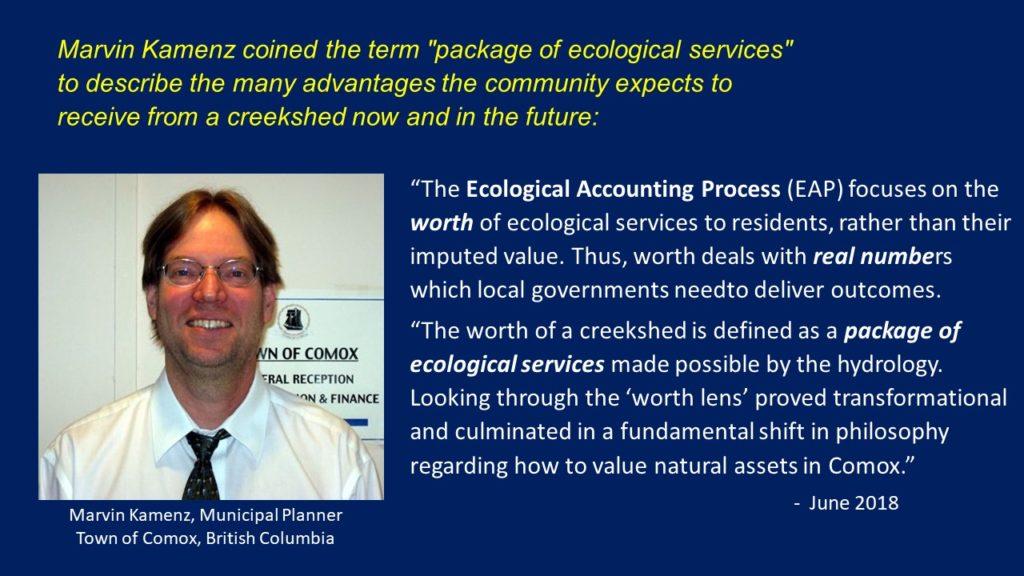VALUATION OF NATURE’S SERVICES: “Quantifying and valuing nature are complex tasks. Undertaking them alters our conception of nature. As a result of it, nature appears more fragmented,” wrote Professor John Henneberry (University of Sheffield) in a ‘think piece’ published in The Conversation (Dec 2018)
Note to Reader:
In November 2018, The Conversation – an independent, not-for-profit media outlet edited by professional journalists and freely available online – published an article by John Henneberry, Professor of Property Development Studies, University of Sheffield.
 A Chartered Surveyor and Chartered Town Planner, John Henneberry is a co-investigator in Sheffield’s Improving Wellbeing through Urban Nature project, where he is working on the estimation of the costs and benefits that arise from green/blue interventions, how these are distributed among the various stakeholders and the implications for more effective planning, design and implementation of such interventions. The article is titled:
A Chartered Surveyor and Chartered Town Planner, John Henneberry is a co-investigator in Sheffield’s Improving Wellbeing through Urban Nature project, where he is working on the estimation of the costs and benefits that arise from green/blue interventions, how these are distributed among the various stakeholders and the implications for more effective planning, design and implementation of such interventions. The article is titled:
How the neoliberal obsession with valuing nature changes our understanding of it
In November 2017, Professor Henneberry was elected a Fellow of the Royal Town Planning Institute. This honour recognized the major contribution that he has made to planning education over several decades and, importantly, his deepening of the understanding of the complex relationship between property and planning.
His interests lie at the interface between planning and property, and focus on the use of economic instruments in planning and the reproduction of the urban built environment. He has written and researched widely on these topics, and was elected a Fellow of the Academy of Social Sciences for his contribution to the field.
Professor Henneberry’s current research focuses on increasing investment in green infrastructure to enhance urban quality of life.
Connecting the Dots to the Ecological Accounting Process (EAP) – a review by Tim Pringle, Chair, EAP Initiative
The work of the Partnership for Water sustainability in British Columbia to develop the Ecological Accounting Process (EAP) identifies the same methodological problems that Professor Henneberry identifies in his opinion piece. Natural systems do not dissect conveniently in order to be quantified and given financial value.
 Professor Henneberry makes some keen observations about determining the financial value of “nature” (natural assets and services provided by those assets). His primary reference is the United Kingdom where the Office of National Statistics has been working since 1997 to produce the “UK Natural Capital Ecosystem Services Accounts” for inclusion by 2020 in the national accounting of public assets.
Professor Henneberry makes some keen observations about determining the financial value of “nature” (natural assets and services provided by those assets). His primary reference is the United Kingdom where the Office of National Statistics has been working since 1997 to produce the “UK Natural Capital Ecosystem Services Accounts” for inclusion by 2020 in the national accounting of public assets.
He points out that “before we can measure or count something, we need to know what it is. It must be distinguishable (clearly identified) and distinctive (differentiated from other things).” His conclusion, “the sum of these parts is far short of the whole and does not capture the interconnectedness and holism of nature”.
Start With a Social Approach!
The strategy of the EAP is simple. Approach the problem from a social point of view. What does the community think its ecological assets and services are worth. Worth will be reflected in investment of time, dollars and services to maintain and manage local ecological assets such as a stream and associated riparian areas. These are commons assets. To the extent that a community recognizes and wants to use/enjoy commons assets it will invest.
Not the least of these investments is the commitment of lands to harbour such assets. These lands can be defined and their financial value determined by using BC Assessment data. EAP employs both of these analytical methods.
In summary, it is not the technical-financial approach that allows us to quantify the worth of a natural (ecological) asset. Rather, it is how the community uses and understands the ecological asset that determines the value. In British Columbia, this is a starting point when we talk about EAP and valuing the package of ecological services made possible by the hydrology of a creekshed!

How the Neoliberal Obsession with Valuing Nature Changes Our Understanding of It – by John Henneberry
“Over the last decade, an industry has developed that values different aspects of nature in different ways. Its growth has been underpinned by the argument that, in a neoliberal world where the market is the dominant mechanism for distributing scarce resources, those assets that cannot be priced and traded are either undervalued or overlooked. Putting a price on nature allows it to be included in the market calculus and, thereby, to be noticed,” wrote Professor John Henneberry.
“It is also argued that the discipline involved in doing this contributes to more rational and therefore better decisions involving nature.
“This drive to subject nature to an economic rationale, to make it capable of being valued and marketable, has been much criticised. Some of the arguments are philosophical, pointing to the inability of economics to capture the extraordinary, intrinsic character of nature. Other arguments are more practical, highlighting the difficulty of determining the economic value of a public good, such as nature, that is not traded.
“Both perspectives have their merits. But here I want to take a different approach, and consider what we do to nature in order to make it amenable to calculation.”
To Learn More:
To read the complete article by John Henneberry, download a PDF copy of How the neoliberal obsession with valuing nature changes our understanding of it.

Human parcelling up of nature is not natural. Zangrilli Andrea/Shutterstock.com

